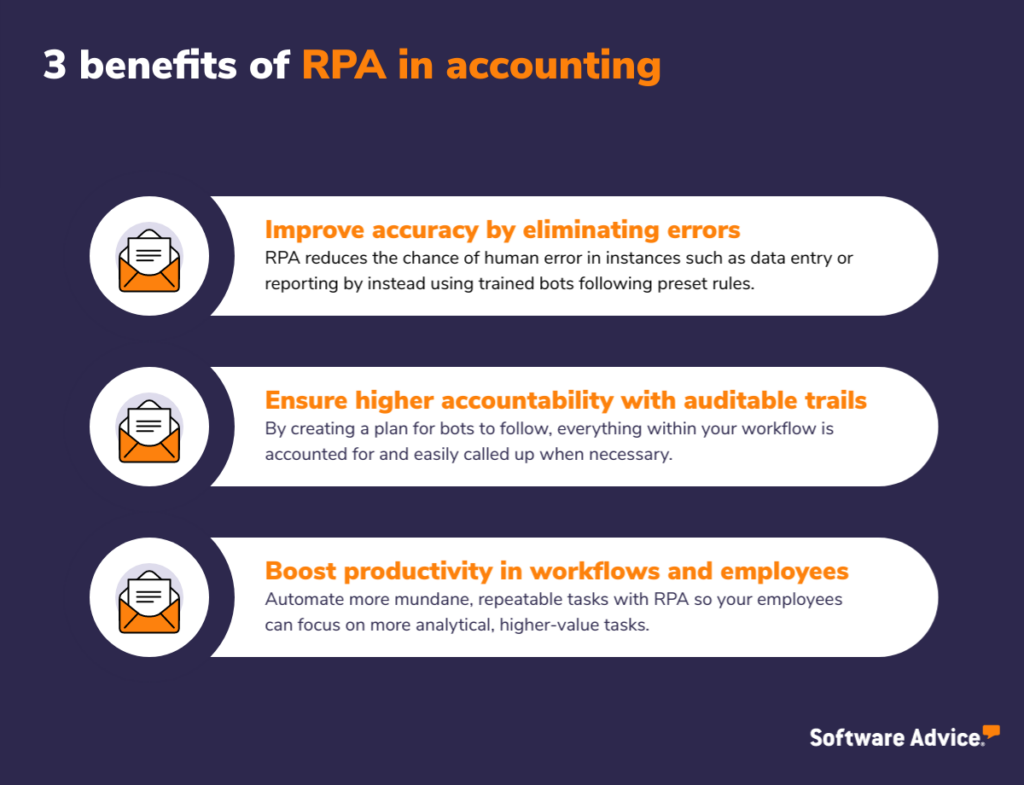The Benefits of Adopting RPA For Your Accounting Functions

In today’s world of high-speed information and pressing deadlines, efficiency is one of the most sought after qualities in all business processes. Yet within accounting, many SMB leaders and account managers still struggle to increase their efficiency in daily accounting tasks. This is where robotic process automation (RPA) comes into play.
If you are an SMB leader overlooking the finance department or an accounting manager that is looking for ways to keep your processes flowing at peak performance, RPA is the key to bringing your accounting functions up-to-date and maximizing efficiency.
Let’s take a further look at what RPA is and how it could help you streamline your accounting processes.
What is robotic process automation?
Robotic process automation (RPA) is a productivity tool that allows users to configure scripts or “bots” that imitate selected tasks within a process. These processes may include manipulating data, exchanging information from system to system, triggering responses, or even executing transactions. RPA helps businesses to automate and optimize these processes, reducing repetitive work and enhancing employee productivity.
For instance, your team may still be spending hours in front of spreadsheets manually entering/retrieving data or transferring numbers—these are the perfect tasks for RPA bots to step in, take over, and begin to automate.
If your company is already using accounting software, it doesn’t mean RPA isn’t for you. Rather, RPA can be used alongside these other applications to bridge the gap between disconnected processes, or to integrate separate accounting and finance tools, with numerous benefits to managers and employees alike.
What are the benefits of RPA in accounting?
The RPA industry is growing rapidly, as businesses are becoming increasingly aware of the benefits of digitizing their processes—in 2021 alone, the RPA software market grew by 31% to $2.4 billion [1].
In addition, industries such as manufacturing have already seen the success of RPA implementation by streamlining the assembly of everything from automobiles to small cellular components.
As RPA makes its way into accounting, the following are a few areas that can derive real benefits from robotic automation.
Improve accuracy with RPA by eliminating human errors
Despite everyone’s best efforts, to err is human—but in accounting, a simple numerical mistake can lead to drastic losses down the road and countless hours of corrections. RPA reduces the chance of human error in instances such as data entry or reporting by instead using trained bots following preset rules to handle data.
According to Gartner research, human error within the finance function produces, on average, 25,000 hours of avoidable rework at a cost of $878,000. [2] RPA bots provide consistent results based solely on the data provided, leaving you with continued higher accuracy and accountability.
Ensure higher accountability with easily auditable trails left by each RPA bot
Given the constantly changing regulatory environment, having a seal-proof paper trail to look back on is a necessity in accounting and finance processes. By creating a well-thought-out plan for the bots to follow, everything within your workflows is accounted for, from accesses made to every generated output.
All these data points are stored in a database, holding relevant parties accountable for all bots’ actions. All this reviewable information at your fingertips increases compliance while decreasing the chance for fraudulent activities to go unregistered.
Boost productivity with RPA not only in workflows, but also in employees
Since RPA bots mimic human actions in a given workflow, such as filling in forms, moving files, or scraping data, the employees that had previously been required to do these things are now free to focus their time on more analytical, higher-value tasks.
These practices are also scalable to match your company needs, as RPA bots are able to tackle massive amounts of data. Let’s say there’s an influx of invoices or payment orders to process, or large legacy systems that need to be overhauled and have data exchanged. Rather than deploying numerous employees, a set of processes can be established and the bots can get to work. RPA provides accounting teams room for growth while keeping productivity at its peak.
SOURCE: https://www.softwareadvice.com/resources/what-is-rpa-in-accounting-and-finance/